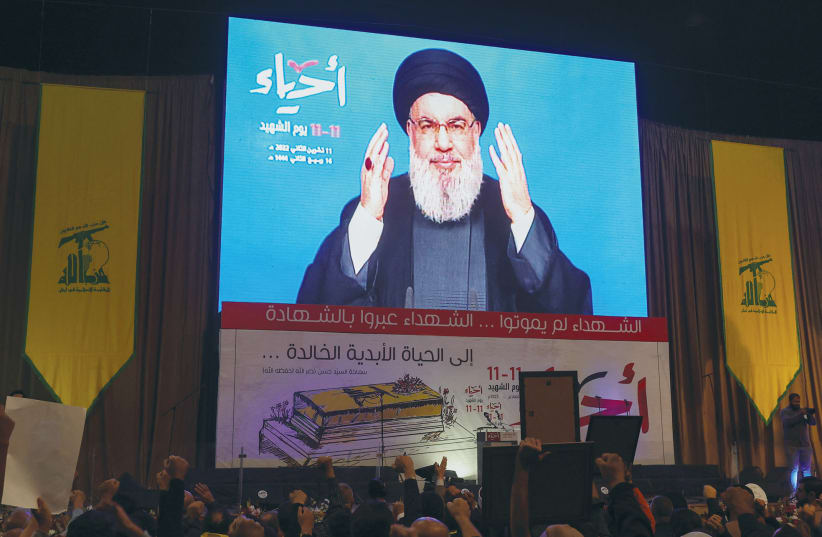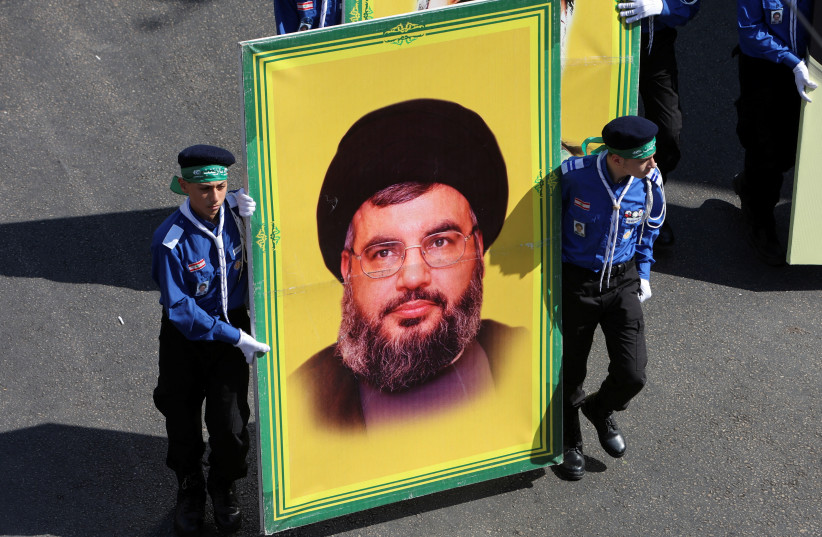Amid recent security tensions in the north, Hezbollah Secretary-General Hassan Nasrallah spoke on Thursday night for the "Day of Resistance," where he marked 23 years since the IDF left Lebanon, and responded to statements made by the Israeli Military Intelligence Directorate Aharon Haliva.
"You are not the ones threatening war, it is us who do so," Nasrallah emphasized. "And any such war will include all of Israel's borders." He further said that "any wrong action in Palestine, Syria or Iran could lead to a major war."
He further said that "after the Israeli withdrawal from Lebanon in 2000 and the withdrawal from Gaza, the concept of 'Greater Israel' no longer exists. Today, it hides behind walls of fire and is unable to impose its terms in any negotiations with the Palestinians. American hegemony no longer exists in the world, and the mentality in the Arab world has shifted, and this is what worries Israel."
"You are not the ones threatening war, it is us who do so. And any such war will include all of Israel's borders. Any wrong action in Palestine, Syria or Iran could lead to a major war."
Hezbollah Secretary-General Hassan Nasrallah
The Hezbollah official stated that any war including all of Israel's borders will have "hundreds of thousands of fighters participating in the campaign" and claimed that "the Israeli front is facing an ideological retreat, it is weak.
"We have hope to liberate Palestine, to pray in the Al-Aqsa Mosque and to get rid of the occupying entity," he added.
He later referred to the normalization processes between Israel and Arab and Muslim countries in the region. "The Israeli enemy succeeded in normalizing its relations with some Arab states, but it failed to normalize relations with its own people. The occupying Israel realized that the Arab regimes are unable to do this, so they impose normalization on their people.
"Although Iran supports the Palestinians, they are the decision-makers and they are the ones who operate within the resistance. One of the most important transformations that have taken place is the deterrent power of the resistance forces. The Israelis failed to strengthen their own deterrent power, and realized that they will pay the price for every crime they commit," he added.
IDF intel chief: Nasrahllah 'close to making a mistake'
Last Wednesday, Haliva, participated in the Herzliya conference at Reichman University and warned that "sometimes, unfortunately, Nasrallah is close to making a mistake that could degenerate the region into a major war. He is close to this mistake from Lebanon and Syria.
"To this, I also add the growing self-confidence of President Assad. We saw his last visit to Saudi Arabia, the hug with Mohammed bin Salman and the way he contemptuously does not listen to Zelensky's speech, alongside the fact that he approves the launch of an Iranian drone from Syrian territory.
"All of these create a high potential for escalation in the region and we need to be prepared for our enemies not to understand the message that we are conveying. Make no mistake, we are ready to use force and will do everything possible and everything necessary to bring peace," he continued.
He also added that "Iran entered 2023 from a negative angle - the riots, the supply of weapons to Russia, which continues to this day, and the real criticism against Iran was not on the nuclear issue but on this issue.
"This stems from entire global processes from understanding that for all the players involved, it's impossible to just lean on one pillar no matter how good it is, and therefore agreements are signed, alliances are formed and the State of Israel needs to examine in depth its position in the region in the face of these developments.
"Even today Israel is an asset country. It has technological, military and intelligence capabilities as well as a strong economy, and it's a powerful country that needs to take advantage of its assets. This requires a partnership with the US and an understanding of the web that is developing and where it is right for us to position ourselves."

